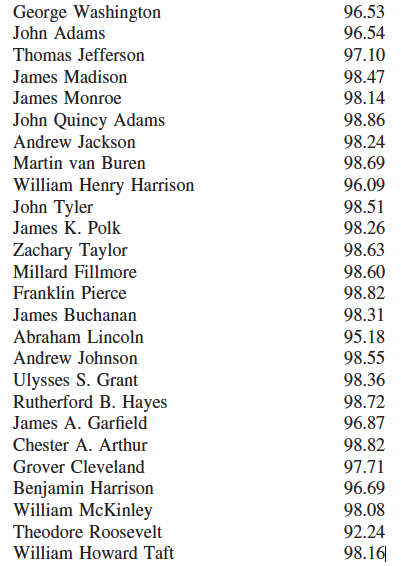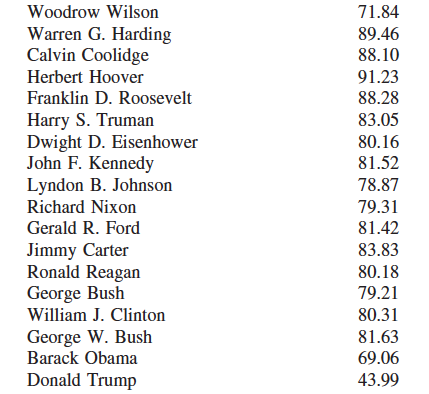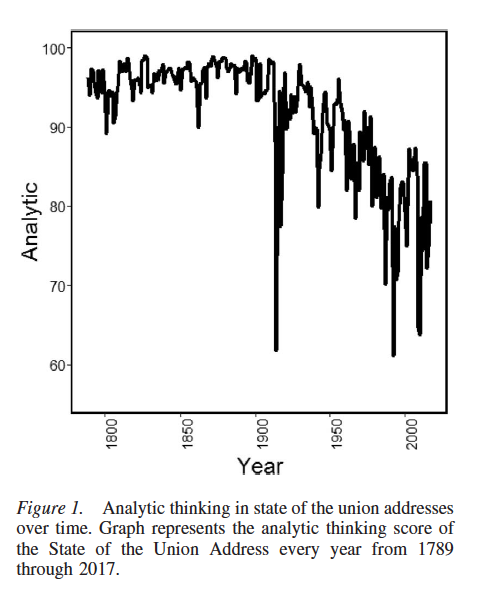An interesting article appears in the current issue of Translational Issues in Psychological Science: it describes research (based on analysis of inaugural addresses, presidential documents, State of the Union Addresses, and general election debates) into the level of analytical thinking among United States presidents from Washington to Trump. (H/T Alternet)
The article, The exception or the rule: Using words to assess analytic thinking, Donald Trump, and the American presidency, by Kayla Jordan and James Pennebaker, assigns an “average analytic score” of 96.53 for George Washington at 96.53 and 43.99 for Donald Trump.
The scores for all the presidents are listed and analysed, but there appears to me to be one correlation that is not addressed at all in the discussion. It relates to a change or turning point with Woodrow Wilson. Let me explain.
The first twenty-six presidents, Washington to Taft, all have average analytic scores bouncing around the high 90s.
Then Woodrow Wilson appears and the 90s are touched only once after that:
I can’t say it’s a fact, of course, because I have not myself analysed the documents from which the scores were derived or the advice that went into the preparation of them.
But I can’t help but wonder if there is any causal relationship here to the introduction of “scientific” propaganda techniques through the Committee on Public Information (or Creel Committee). One of the more famous names on the Committee was, of course, Edward Bernays, a nephew of Sigmund Freud.
The age of propaganda through researched psychological techniques began in America with Woodrow Wilson’s efforts to persuade Americans to get involved in “World War 1”.
I don’t think the propaganda machine has removed itself totally from political usefulness ever since. The Cold War era was obviously a time of propaganda warfare, and one has to be an ostrich not to have noticed the efforts of “public relations” machinery in American presidential elections and political image work ever since.
Another graphic in the article that points to the Woodrow Wilson turning point:
Those are my thoughts.
The authors of the article do not mention any of that but have another take. Their second points directly to the tools of mass propaganda as they emerged in the Franklin D. Roosevelt years.
The first possible explanation for the decline in analytic thinking is changes in who is voting and what they want in a President. The presidential electoral process has changed markedly since the election of George Washington. The groups of people eligible to vote have expanded considerably from only property-owning white men to nearly everyone over the age of 18 years. . . .
The second potential factor surrounds advances in technology and changes to media. Technologies like radio, television, and the Internet have greatly expanded the number of people that candidates can reach as well as the amount of press coverage the presidency receives. . . .
The final possible explanation is the decline in trust/hope people have in various political institutions. Whereas all Presidents have their ups and downs in terms of their approval ratings, average approval ratings have been dropping since Franklin Delano Roosevelt (Gallup, 2017). In fact, the American people have steadily been losing trust in both their political leaders and the American people in general (Jones, 2016). In this environment, people may increasingly prefer straight-talking leaders offering simple solutions. . . . (p. 315)
Jordan, K. N., & Pennebaker, J. W. (2017). The Exception or the Rule: Using Words to Assess Analytic Thinking, Donald Trump, and the American Presidency. Translational Issues in Psychological Science, 3(2), 312–316. http://dx.doi.org/10.1037/tps0000125
If you enjoyed this post, please consider donating to Vridar. Thanks!




While the chart seems to be negative towards Obama, compassion is technically irrational and likely motivating the right wing reaction.
“compassion is technically irrational”
So, it’s “technically irrational” to be a moral person?
Yes, technically it’s irrational to give some of your food to your neighbor who is starving if it meant that it increases the likelihood that you would starve.
God! It’s like the ice areal, extent and volumetric decline in the Arctic! Tige, you are right, and Trump has broken through the floor with his (lack of) analytical capabilities. We in the United States are soooo screwed.
Neils article should make us thing on a deeper level. It is to simplistic to just think that Obama or Trump are the simpletons of all the past Presidents. If the trend continues we should have an imbecile in the White house within the next 30 yrs. or so. I don’t expect to be alive then. 🙂
One possible reason for the language change could be. Language has changed in the last 100 years. If you read books written in the 1870 till about 1930 there’s seems to be a difference in the words used by writers. The writers of yesterday year seem to be more elegant and flowery in their prose. I have notice this in my readings. Another possible reason is the dumb-ing down of the American educational system. My Grandparents and Parents whom never had more then a 8 – 10 grade education where smarter and more informed then most college graduates today. So, if the Presidents did’nt lower their speech, no one would understand a dam thing they say….. We don’t understand much they say anyway.
One last point, Mr. Obama was a Harvard educated law Professor. He was not / is not an ignorant uneducated man.
This doesn’t tell you the President is an imbecile, even though that happens to be so, it tells you that he speaks in ways which do not appeal to rational thought but rather to emotions.
Against explanations that look at education levels Jordan and Pennebaker make the following observation:
To explain “analytic thinking” J and P write
Trump is said to be an outlier, even though part of a longer-term trend:
Just how much of an outlier:
Americans in general and the Republican party in particular are in a state of desperation because the political dynamic of the past 40 years, originating in the Reagan era, has reached rock bottom. All the easy low hanging fruit of tax cuts and spending cuts have been exploited.
From an analytical perspective they would have to go against things that people have believed most or all of their lives, simplified in outdated anti-Communist rhetoric. Instead it’s easier to make appeals to emotion with no theory to back it up. This is what people want when they go to a psychic or priest. It doesn’t mean that psychics and priests are ignoramuses, they’re smart enough to fool lots of people, and those people don’t learn that psychics and priests are frauds. In fact it’s human nature to react defensively when they begin to realize they’ve been fooled. Not surprising Trump’s approval rating is so low yet doesn’t go below a certain floor.
Around 33% represents the absolute die-hards who will never reject their current set of beliefs simply because they are under attack. If Trump had not won, it would have been possible for them to slink out from under their political identity exactly as they did after Dubya’s presidency ended. All they needed was to be ability to save face while gleefully accusing the “other” of being “political” for pointing out the facts.
The FOX is in the hen house.